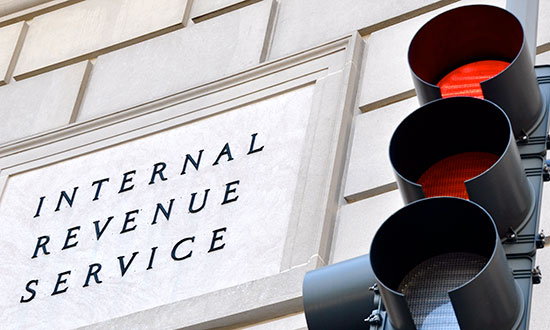
March 17, 2021 – The federal government shut down in December 2018 after Congress and the White House failed to reach a spending deal to keep the government funded.
The 35-day shutdown that followed was the longest in U.S. history. Through 2019 and early 2020, the understaffed Internal Revenue Service (IRS) was trying to catch up on processing returns, setting up payment agreements, responding to mail and resolving taxpayer disputes. Then COVID-19 hit and ground operations to a near halt.
Continued delays in dealing with the mail mean clients will have questions on many topics. This article provides an overview of the current backlog and makes recommendations concerning several common issues.
Operations Halted
As was the case for public and private sector employees around the country, IRS employees were sent home when COVID-19 hit last year. While some IRS employees were able to work remotely (auditors, attorneys, some collection agents), COVID related restrictions limited what could be accomplished in many of these cases.
 Rob Teuber is a shareholder at von Briesen & Roper S.C., Milwaukee, focusing his practice on tax disputes and controversies for clients nationally, regionally and locally.
Rob Teuber is a shareholder at von Briesen & Roper S.C., Milwaukee, focusing his practice on tax disputes and controversies for clients nationally, regionally and locally.
Taxpayers relying on centralized IRS campuses for results, however, could not connect with anyone to address their concerns.
When IRS campuses were shuttered, the automated notices generated by the IRS systems could not be mailed, so those with liabilities obtained some reprieve.
Yet, taxpayers continued to send in paper returns and payments or respond to notices and letters that they had received. With nobody around to open the mail, returns were not processed and checks were not cashed.
When some IRS employees began to return to the office to address the growing backlog, many reported that there were truck trailers full of unopened mail.
On the return of these IRS employees to the campuses, the IRS began mailing notices that had been printed before the COVID shutdown.
IRS Notices
Due to time and cost considerations, the IRS did not reprint the notices with updated mailing dates. This meant that in mid to late summer 2020, many taxpayers began receiving notices threating levy if a matter was not addressed by a now long expired date. Many of these taxpayers had already fully paid the debts in the months before.
The IRS had the checks, they just had not yet opened the mail to know it. Understandably, such situations triggered many panicked calls to the IRS whose phone lines were only partially opened. If these taxpayers were able to get through to anyone at all, it often required long wait times.
Fortunately, the IRS was well aware of these problems and imposed a lengthy moratorium on most levies and garnishments. To account for the impact of the pandemic on taxpayers the return filing deadline was delayed to July 15 and the IRS allowed for the deferment of installment agreement payments without risking default.
Those taxpayers with representatives have fared better in dealing with the IRS during this time. Often, when a representative is involved, there is an assigned IRS employee who could address problems that arose.
As these assigned agents were able to work remotely, some matters could be resolved fully. Yet, other IRS employees were still limited in what they could accomplish.
A case could be agreed upon, but those at the IRS responsible for processing the resolution continued to be unavailable. In some cases, seemingly conflicting notices could be issued. Often the best that could be conveyed to a client was an assurance that an agreement had been reached.
The IRS is now opening mail and processing returns, payments, refunds and correspondence. Continued delays mean clients will have continuing questions on common issues that are discussed below.
Powers of Attorney
The processing of filed Powers of Attorney is facing severe delays. A Power of Attorney can be faxed to a processing center or submitted electronically. Currently, the IRS does not provide a projected timeframe in which the Power of Attorney may appear on record.
Therefore, if a client matter requires prompt access to information, a practitioner should call the IRS (and deal with the wait times) and fax the Power of Attorney directly to the representative they speak with. While the Power of Attorney will still take a substantial amount of time to appear on record, you will be able to discuss the matters with the agent answering the phone.
Paper Filed Tax Returns
The IRS is still processing 2019 paper returns filed in 2020. Where a tax return is filed depends on where a taxpayer lives. Due to varying backlogs at processing centers, these returns are now being shipped around the country to IRS locations where processing capacity exists. Processing times are slower for those returns which required correction of math errors or where questions of potential identity theft exist.
To check on the status of a refund, a client should first resort to the “where’s my refund” functionality of the IRS website. Prior year returns are being processed at an even slower rate.
Letters and Notices
The IRS is sending notices. Yet, because the IRS is responding to taxpayer correspondence in the order received, the IRS is facing severe delays in addressing concerns. Many months will pass before the IRS responds.
Watch out for any and all notices received in the meantime so that a procedural right is not lost while waiting for an adjustment to be made. Some IRS notices contain statutory deadlines that will not be extended regardless of the cause for delay.
Payments
If possible, make any payments electronically. This can be done through the IRS website. If a payment is mailed to the IRS, the check may not be timely cashed.
The IRS is supposed to credit the check to an account as of the date the payment is received. Therefore, when mailing a payment, send the payment by certified mail or otherwise with a tracking number so that the delivery date can be confirmed.
Do not cancel a payment check as dishonored check fees will apply. Respond to any notices received in the interim.
Backlog will Continue
As the COVID backlog arose in the wake of the preceding government shutdown backlog, it is likely that IRS operations will not return to normal for a long time.
Until it does, clients should understand that most processes will continue to be slow and should be mindful of any and all notices received.
Fortunately, the same issues plaguing the IRS are not impacting the Wisconsin Department of Revenue (WDOR). Any delays or backlog that may have impeded the WDOR in 2020 now appear to have been addressed.
In most instances, WDOR is addressing and responding to contact by taxpayers and representatives in traditional timeframes. From a taxpayer’s perspective, if the ability to address a Wisconsin tax issue is dependent upon a related federal matter, clear communication with the WDOR about the federal delays should be made.
